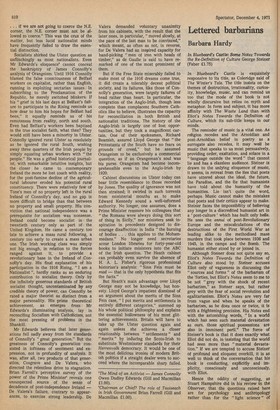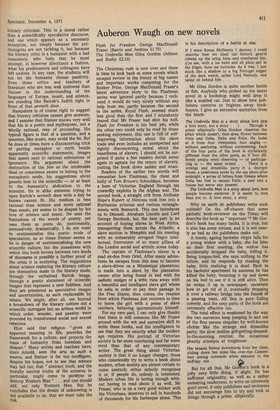Lettered barbarians
Barbara Hardy
In Bluebeard's Castle: Some Notes Towards the Re-Definition of Culture George Steiner (Faber £1.75)
In Bluebeard's Castle is exquisitely responsive to its title, as Coleridge said of The Winter's Tale. The title insists on the themes of destruction, irrationality, curiosity, knowledge, music, and can remind us too that the mode of the book is not wholly discursive but relies on myth and metaphor. In form and subject, it has more affinity with The Waste Land than with Eliot's Notes Towards the Definition of Culture, which its sub-title keeps in our minds.
The reminder of music is a vital one. As religion recedes and the Arnoldian and post-Arnoldian belief in poetry as a surrogate also recedes, it may weld be music that speaks to us most persuasively, providing order, exaltation, and solace in a "language outside the word" that cannot lie and has a Classless audience. Steiner is drawn to the unlying eloquence of music, it seems, in retreat from the lies that poets have uttered about the ideal, the future, the Paradise, and the die that humanists have told about the humanity of the humanities. Lie isn't quite the word, perhaps. Music cannot make the mistakes that poets and their critics appear to make. Steiner faces the impossibility of believing any longer in a discredited humanist art in a ' post-culture ' which has built only hells. He sees the ennui of post-Revolutionary Europe and the miscalculations of the destructions of the First World War as leading alike to the methodised mass murders that took place between 1936 and 1945, in the camps and the Bomb. The humanist either stood by or joined in.
Although Steiner does not quite say so, Eliot's Notes Towards the Definition of Culture also stood by. Steiner accuses Eliot only of vagueness in discussing the "sources and forms" of the barbarism of the 'forties, but Eliot's Notes seem to me to be not "grey with the shock of recent barbarism," as Steiner says, but rather grey with the fear of social revolution and egalitarianism. Eliot's Notes are very far from vague and when he speaks of the barbarism, as he does once or twice, it is with a frightening precision. His Notes end with the astonishing words, "In a world which has seen such material devastation as ours, those spiritual possessions are also in imminent peril." The force of Steiner's book is that it does exactly what Eliot did not do, in insisting that the world had seen more than "material devastation." If we are tempted to accuse Steiner of profound and eloquent overkill, it is as well to think of the conversation that his book is conducting, explicitly and implicity, consciously and unconsciously, with Eliot.
Hence the oddity of suggesting, as Stuart Hampshire did in his review in the Observer, that the questions raised here are for psychology and anthropology rather than for the "light science" of literary criticism. This is a moral rather than a scientifically speculative discourse, and one which appears as a necessary enterprise, not simply because the psychologists are not tackling it, but because the literary critic is a humanist with a bad conscience, who feels that he must attempt, in however diletttante a fashion, what his predecessors and colleagues have left undone. In any case, the students will not let the humanist choose passivity. Even those critics and teachers of literature who are less well endowed than Steiner in the understanding of the languages of Europe, music, and science, are standing like 13artok's Judith right in front of that seventh door.
Hampshire is of course right to suggest that literary criticism cannot give answers, and I assume that Steiner knows very well that his is a poetic and mythopoeic, not a Wholly rational, way of proceeding. His typical figure is that of a question, and a question, like music, may avoid the lie. But he does at times have a disconcerting trick of putting metaphor or myth beside apparently scientific statements, images that assert next to rational admissions of ignorance. His argument about the destruction of the Jew as the intolerable ideal or conscience seems to belong to the metaphoric mode, his suggestions about genetic loss to the scientific — or at least to the humanist's abdication to the scientist. He is alike someone trying to open Bartok's seventh door with a key he knows cannot fit. His medium •is less rational than science and more rational than music, yet seems to be shaped by his love of science and music. He sees the limitations of the words of poetry, yet uses them as poets do, passionately, persuasively, dramatically. I do not want to sentimentalise this poetic mode of speculation, as at times Steiner seems to be in danger of sentimentalising the new scientific culture, but the uneasiness with which this book hovers between two kinds of discourse is possibly a further proof of the crisis it is analysing. The suggestions about science replacing the literary culture are themselves made in the literary mode, through the verbalised Bartok 'image, through a poetic statement of scientific images that represent a new Sublime. And they are presented as speculative images and uncertainties, as such replaceable by others. We might, after all, see beyond a breakdown of the literary culture not a scientific surrogate but an artless world in Which order, wonder, and passion were provided by transformed social and sexual relations.
Eliot said that religion "gives an apparent meaning to life, provides the framework for a culture, and protects the mass of humanity from boredom and despair." Many artists and teachers have, since Arnold, seen the arts as such a source, and Steiner is far too intelligent, despite his hopes, not to see that science may fail too, that "abstract truth, and the morally neutral truths of the sciences in Particular, might come to paralyse or destroy Western Man" . .. and one should add, not only Western Man. But he concludes that the dream of unknowing is not available to us, that we must take the risk.











































 Previous page
Previous page